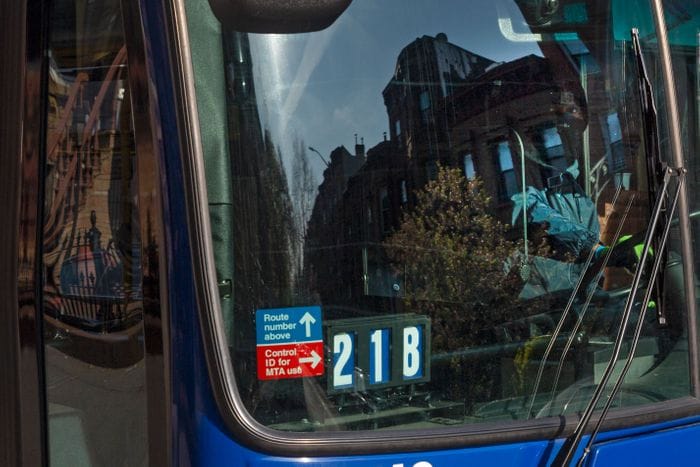Bus Drivers Hardest Hit By Deaths As COVID-19 Devastates MTA


By Jose Martinez, originally published in THE CITY on April 8, 2020

For 15 years, Ernesto Hernandez drove MTA buses around his home borough of Brooklyn, based out of the Jackie Gleason depot in Sunset Park.
“Work, church, family,” said his son, Steven Jimenez, 34. “He was a straight arrow, a good church man.”
Hernandez, 57, kept that routine, his son said, until he started to feel lousy on March 20. “He thought it was allergies,” Jimenez said.
A little more than a week later, Hernandez became one of the MTA’s first COVID-19 fatalities during the pandemic — and one of seven bus operators, so far, to die from coronavirus.
‘Heroic Work’
Among the at least 33 subway and bus workers who have died from COVID-19, the MTA’s bus drivers have taken the biggest hit in an agency with more than 74,000 employees.
By comparison, the NYPD has lost 13 members to COVID-19 from a workforce of more than 55,000 people, while the FDNY has suffered two deaths among its more than 40,000 employees.
During his Tuesday briefing, Gov. Andrew Cuomo saluted the sacrifices of transit workers, pointing out how difficult it can be for bus operators to socially distance.
“They’re doing heroic work, very high rate of illness — that’s a problem,” Cuomo said.
Ridership has plunged across the transit system, as the MTA has reduced service and encouraged all but essential workers to steer clear of trains and buses.
“Our heroic employees come to work every day during this unprecedented public health crisis so other essential workers like doctors, nurses, pharmacists, grocers and food delivery workers can do their jobs,” said Ken Lovett, an MTA spokesperson. “The death of any of our colleagues is personal; not about statistics.
“We greatly mourn those we’ve lost as we continue to do all we can to protect our workers and customers.”
Widespread Losses
The toll among bus drivers has been spread across the boroughs — all of the dead were based in separate depots in Queens, Brooklyn, Manhattan and The Bronx — highlighting the wide reach of the pandemic.
“There’s anger and fear and a lot of concern out there in the workforce,” Tony Utano, president of Transport Workers Union Local 100 told THE CITY. “There’s also an amazing sense of duty and responsibility to our city and neighbors in this war against this virus.”
Jimenez noted his father was emblematic of the MTA’s working-class and largely minority workforce, which according to a December report, is 40% black, 16% Hispanic and 10% Asian.
Workers between the ages of 55 and 62 make up 22% of New York City Transit’s employees, according to a demographic breakdown obtained by THE CITY.
“We are middle class, working for the MTA,” said Jimenez, who works in construction project management. “We have to go out, we just can’t sit at home and say we have enough money to not go to work.”
Hernandez’s March 29 death came one day after he’d checked into Maimonides Medical Center in Brooklyn.
“It was so quick,” Jimenez said. “That’s why it’s all so shocking, that’s why we are devastated.”
More Protection Wanted
In the weeks before Hernandez got sick, union leaders pushed the MTA to distribute masks to bus drivers and other transit workers. Jimenez said his father worked without protective gear.
“Now, when you see a bus driver, they have a mask and gloves,” Jimenez said. “But back then, my dad never got a mask or single pair of gloves.”
The MTA initially followed Centers for Disease Control and World Health Organization guidance on masks, which said they were not recommended for healthy people as protection against COVID-19. But after an initial wave of deaths, the agency reversed course and began distributing masks to workers.
“They should have moved a lot quicker and provided more protection,” said Nache Patoir, whose father, Patrick, a transit worker, died March 30.
Patrick Patoir was a subway car maintainer at the Pitkin Yard shop in Brooklyn. A father of four and a former Marine, he worked 33 years for the MTA.
Patoir had started feeling sick 10 days before he died, but “thought he was going to get over it,” Nache Patoir said.
‘It’s a Little Late’
His last day of work was March 21, his family said, and he was at SUNY Downstate Medical Center the next day — his 57th birthday.
“I looked at him and he didn’t look too good,” said his widow, Marcia Patoir, 56. “His exact words to me were that the bosses were going back and forth about cutting staffing, that they couldn’t make up their minds.”
“He was dedicated to his job, and it was to his detriment,” his daughter said.
On the day Hernandez started feeling sick, the agency announced it would bar front-door boarding and force riders to sit at least three rows back from bus drivers in an effort to stop the spread of the virus.
“They’re realizing they gotta protect their workers,” Jimenez said. “But it’s a little late.”
Adding to the family’s misery, Hernandez’s widow, Maria, has tested positive for coronavirus. The 63-year-old school aide has not yet been admitted to a hospital
.
“I already lost my dad and my mom is fighting it off,” Jimenez said.




